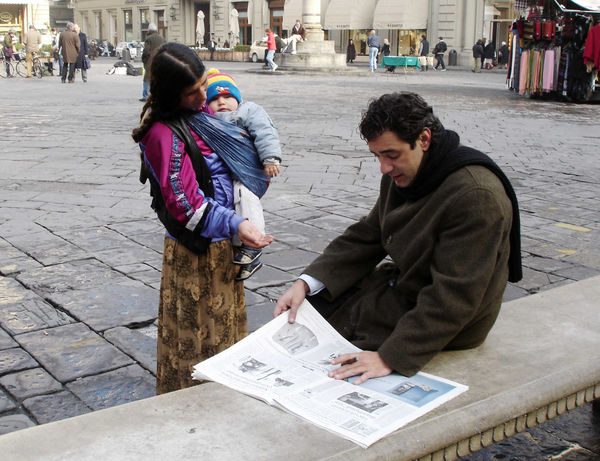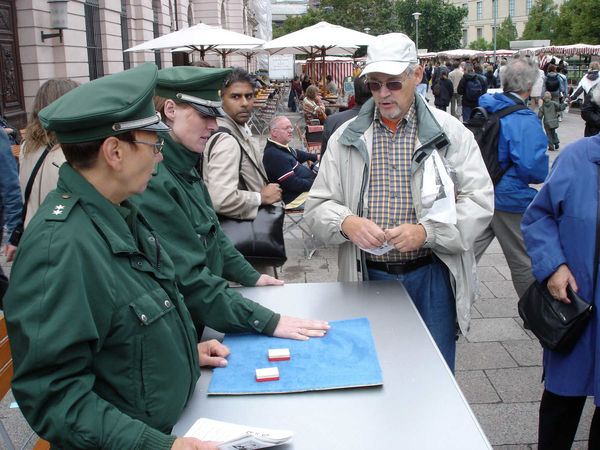Tourist Scams and Rip-Offs


By Rick Steves
Europe is a surprisingly creative place when it comes to travel scams. Many of the most successful gambits require a naive and trusting tourist. But it can happen to more sophisticated travelers, too. There are many subtle ways to be scammed — a cabbie pads your fare, a server offers a special with a "special" increased price, or a public computer records your password. Be smart: Know what you are paying for before handing over money, and always count your change.
Scam artists come in all shapes and sizes. But if you're cautious and not overly trusting, you should have no problem. Here are some clever ways European crooks bolster their cash flow.
Such a Deal!
If a bargain seems too good to be true…it's too good to be true.
The "Found" Ring: An innocent-looking person picks up a ring on the ground in front of you and asks if you dropped it. When you say no, the person examines the ring more closely, then shows you a mark "proving" that it's pure gold and offers to sell it to you for a good price — which is several times more than the scammer paid for it before dropping it on the sidewalk.
The "Friendship" Bracelet: A vendor approaches and aggressively asks if you'll help with a "demonstration." The vendor proceeds to make a friendship bracelet right on your arm, then asks you to pay a premium for it. Since you can't easily take it off on the spot, you feel obliged to pay up. (These sorts of distractions can also function as a smokescreen for theft — an accomplice is picking your pocket as you try to wriggle away from the pushy vendor.)
Salesperson in Distress: A well-spoken, well-dressed person approaches you and claims to be a leather-jacket salesperson in need of directions. After chatting you up ("Oh, really? My cousin is from Chicago!"), the salesperson reaches into the car and pulls out a "designer leather jacket" to give to you as a thank you for your help. The salesperson then claims their credit card isn't working and asks you for cash to pay for gas. Once you oblige, the salesperson takes off, leaving you with your new, overpriced vinyl jacket.
Money Matters
In restaurants, in stores, at ticket booths, everywhere — expect to be cheated if you're not paying attention. Be alert any time money changes hands, you withdraw money from an ATM (see my tips on keeping your cards safe), or when you check your bank balance (not a good idea over public Wi-Fi).
One of the best tips may be to use a mobile payment app on your phone to tap and pay instead of digging for cash or a credit card. Otherwise, when paying for things, keep your cards in your sight and always count your change. Be savvy to the following scams.
Slow Count: Cashiers who deal with lots of tourists thrive on the slow count. They'll count your change back with odd pauses in hopes that the rushed tourist will gather up the money early and say "Grazie."
Switcheroo — You Lose: Be careful when you pay with too large a bill for a small payment. Clearly state the value of the bill as you hand it over. Some cabbies or servers will pretend to drop a large bill and pick up a hidden small one in order to shortchange a tourist. Get familiar with the currency and check the change you're given. Be alert for non-European coins that dishonest vendors try to pass off as €2 coins.
Talkative Cashiers: Be aware of shop cashiers who appear to be speaking on the phone when you hand over your credit card: They may surreptitiously take a picture of your card. Consider paying cash for smaller purchases.
Meeting the Locals
I want my readers to meet and get to know Europeans — but watch out for chance encounters on the street.
Beggars: You'll meet a lot of people with beautiful eyes, beautiful children, and sad stories. They'll step right up and say, "Euro, please give me a euro." They don't want a euro; they want your wallet. Many beggars are pickpockets. Understand that.
Oops! You're jostled in a crowd as someone spills ketchup or fake pigeon poop on your shirt. The thief offers profuse apologies while dabbing it up — and pawing your pockets. There are similar schemes: Someone drops something, you kindly pick it up, and you lose your wallet. Or someone throws a baby into your arms as your pockets are picked. Treat any commotion (a scuffle breaking out, a beggar in your face) as fake — designed to distract unknowing victims. If an elderly person falls down an escalator, stand back and guard your valuables, then…carefully…move in to help.
The "Helpful" Local: Thieves posing as concerned locals will warn you to store your wallet safely — and then steal it after they see where you stash it. Or they may steal it first and then brazenly bring it back to you, saying they just found it on the ground. If someone wants to help you use an ATM, politely refuse (they're just after your PIN code). Some thieves put out tacks and ambush drivers with their "assistance" in changing the tire. Others hang out at subway ticket machines eager to "help" you, the bewildered tourist, buy tickets with your quickly disappearing foreign cash. If using a station locker, beware of thieves who may have their own key to a locker they'd like you to use. And skip the helping hand from official-looking railroad attendants at the Rome train station. They'll help you find your seat…then demand a "tip."
Young Thief Gangs: These are common all over urban southern Europe, especially in the touristy areas of Milan, Florence, and Rome. Groups of kids with big eyes, troubled expressions, and colorful raggedy clothes politely mob unsuspecting tourists. As their pleading eyes grab yours, they hold up pathetic messages scrawled on cardboard, hoping to fool you into thinking that they're beggars. All the while, your purse or backpack is being expertly rifled. If you're wearing a money belt and you understand what's going on here, there's nothing to fear. In fact, having a street thief's hand slip slowly into your pocket becomes just one more interesting cultural experience.
The Attractive Flirt: A single traveler is approached by a good-looking person on the street. After chatting for a while, the con artist invites the traveler for a drink at a nearby nightclub. But when the bill arrives, it's several hundred dollars more than expected — and there are now burly bouncers guarding the exits. There are several variations on this scam. Sometimes, the scam artist is disguised as a lost tourist; in other cases, it's simply a gregarious local person who (seemingly) just wants to show you around. Either way, be suspicious when invited for a drink by someone you just met; if you want to go out together, suggest a bar (or café) of your choosing instead.
Appearances Can Be Deceiving
The sneakiest pickpockets look like well-dressed businesspeople, generally with something official-looking in their hand. Some pose as tourists, with day packs, cameras, and even guidebooks. Don't be fooled by looks, impressive uniforms, or hard-luck stories.
Fake Charity Petition: You're at a popular sight when someone thrusts a petition at you. This person, sometimes pretending to be deaf, tries to get you to sign an official-looking petition, supposedly in support of a charity (the petition is often in English, which should be a clue). The petitioner then demands a cash donation. At best, anyone who falls for this scam is out some euros; at worst, they're pickpocketed while distracted by the petitioner.
Phony Police: Two thieves in uniform — posing as "Tourist Police" — stop you on the street, flash bogus badges, and ask to check your wallet for counterfeit bills or "drug money" or to establish your nationality. You won't even notice some bills are missing until after they leave. Never give your wallet to anyone.
Room "Inspectors": Two people claiming to be the hotel's room inspectors knock on your door. One waits outside while the other comes in to take a look around. While you're distracted, the first thief slips in and takes valuables left on a dresser. Don't let people into your room if you weren't expecting them. Call the hotel desk if "inspectors" suddenly turn up.
Broken Camera: While you're sightseeing, someone approaches with a camera or phone and asks that you take their picture. But the device doesn't seem to work. When you hand it back, the "tourist" fumbles and drops it, causing it to break. The scammer then asks you to pay for repairs (don't do it) or lifts your wallet while you are bending over to pick up the broken object.

